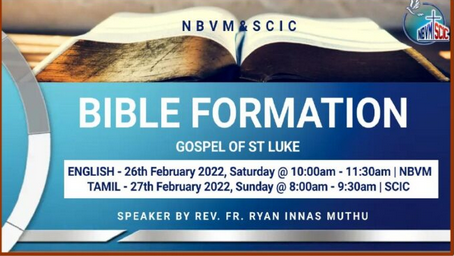Discipleship is a Journey in Imitating Christ
In conjunction with the year of Bible, Fr. Dom the Parish Priest of the Church of Nativity and Blessed Virgin Mary and Sts. Chastan and Imbert invited Fr.Ryan, a scripture scholar to give a series of talks on the Gospel of Luke. The first talk took place on 26 February 2022 via zoom and the participants were from various parishes in Malaysia. This series of talks will be on every last Saturday of the month until June.
Fr. Ryan had done his studies in scripture in Rome and is currently the professor at College General. He uses a thematic approach in explaining the Gospel of Luke and Acts of the Apostle.
Fr. Ryan began the talk by giving a little introduction about the author of the Gospel of Luke and Acts of the Apostle. He said that from Col 4: 14 we can understand that Luke was a physician and a companion of Paul. The similarity in the writings of the Acts of the Apostle points to Luke as the author of both books. The Gospel of Luke and Acts are one book but two volumes. The Gospel of Luke focuses on what Jesus did and taught until ascension while the Acts of the Apostle continues with the story of the risen Jesus and the formation of the early church that eventually spread from Rome to the entire world.
The purpose of the Gospel of Luke is to re-tell the story of salvation. The underlying message is that salvation is for all- Jew and Gentiles. Both Paul and Luke (probably not a Jew) had not seen the historical Jesus but they had experienced the resurrected Jesus. We too have encountered the resurrected Jesus.
The Gospel of Luke addresses Theophilus (could be a person or community) and the Gentile Christians and emphasises on the church because after the resurrection, Jesus sent the disciples and new Christians to carry out His mission. Luke shows that the preaching and teaching of the early church were based on the teaching and preaching of Jesus. Luke asserts that the Gentiles are included in the plan of salvation because of faith even though they did not have the laws and the commandments like the Jews. Hence it is faith in Christ that unites both Jews and Gentiles.
The Gospel of Luke has the following theological themes- Universal Salvation, Saviour of the Poor and Marginalised, Rich and Poor, Joy, Discipleship and the Empowerment of the Holy Spirit. The focus of this talk was Discipleship.
Discipleship
If we wish to become the disciple of Jesus, we need to know who Jesus is – Christology and discipleship are inseparable. Christology is the study of Jesus and discipleship is the journey in imitating Christ. To be his disciples, we must understand the role of Christ; come closer to Christ so that we are moulded to be Christ-like. There are many models in the world but the disciple of Christ has only Jesus as a model to imitate.
Discipleship is a personal call to follow Christ – to align our mission with His mission. The call of Levi (Lk5:27) ‘follow me” in the Greek language “ akoloutheō” means giving up and sacrificing yourself for Christ. Gospel of Luke chapters 9: 51 to 10: 42 explain the call to follow Christ- the mission of the 72, the privilege of discipleship, the commandments and the parables of good Samaritan.
To follow Christ is to carry out His mission and we do that by imitating Christ through faithfulness and witness. Gospel of Luke emphasises on salvation as the present reality and the Christian community is the source of salvation. Luke uses the Greek words “semeron”( today) and “nun” (now) (2: 11; 6:21) – which refer to present reality. Thus salvation is today and now- a present reality. Life is poured out in the Holy Spirit and through the Holy Spirit, we receive salvation. God continues to bring salvation through the new Israel ( Christians). Therefore discipleship is a nature of community established by risen Jesus.
Discipleship is a journey-therefore sometimes we may drift away and may misunderstand. Thus we need to turn back and imitate by hearing and acting on the word- listen and then act. There are many Christians today but our lives do not reflect Christ; it does not imitate Christ. As Christians, we must suffer, face persecution and divisions but we need to endure and follow Jesus (Lk14: 25-33).
Discipleship depends on the empowerment of the Holy Spirit as Jesus did. The power of the Holy Spirit equips one for the mission. Imitating Christ means being empowered by the spirit, having compassion for the poor and the oppressed, healing and forgiving, to pray and dying as a martyr. We need to change our social behaviour in imitating Jesus- through hospitality, generosity, conversion, being a servant leader. We cannot cling to wealth and possessions instead we need to cling to Christ.
Fr Ryan concluded the session with the following questions for reflection:


